News
Ibas rejects Assembly’s move to probe six-month spending
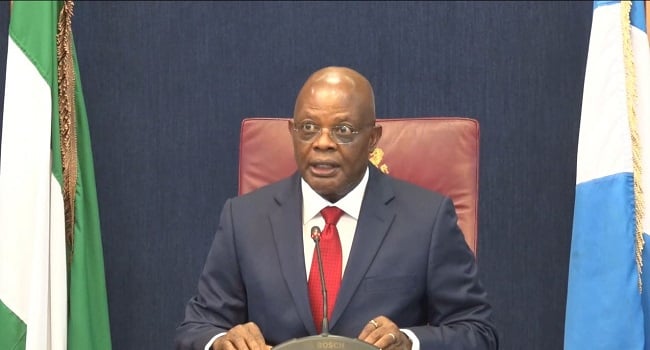
The immediate past Rivers State Administrator, Vice Admiral Ibok-Ete Ibas (retd.), and the Rivers State House of Assembly may be gearing up for a showdown following the latter’s decision to probe the state’s expenditure over the last few months under the former, The PUNCH reports.
Ibas ceased to be the administrator of the oil-rich state on September 17, following the end of the six-month emergency rule, after President Bola Tinubu directed the suspended state governor, Siminalayi Fubara, his deputy, and the state House of Assembly members to return to office from the previous Thursday.
The Rivers State House of Assembly, presided over by the Speaker, Martin Amaewhule, during its first plenary after the end of emergency rule, said it would investigate the state expenditure during the six months of emergency rule.
According to the resolutions of the House, “To explore the process of knowing what transpired during the emergency rule with regard to spending from the consolidated revenue fund for the award of contracts and other expenditure.”
Findings by The PUNCH showed that Rivers State received at least N254.37bn from the Federation Account Allocation Committee between March and August 2025 under the tenure of the sole administrator.
This figure is based on an analysis of FAAC data from the National Bureau of Statistics and other sources.
While the NBS has released official breakdowns up to June, the figures for July and August were collated from documents presented at FAAC meetings obtained and reviewed by The PUNCH.
The data show Rivers took home N44.66bn in March, N44.42bn in April, N42.80bn in May and N42.30bn in June, according to NBS.
In July, the state received about N38.42bn, while in August it collected N41.76bn, according to the documents analysed.
These brought total net allocations in the six months to N254.37bn, averaging N42.40bn per month.
If September follows the same trend, Rivers’ inflows could reach nearly N297bn in seven months.
However, the structure of these allocations highlights the state’s heavy dependence on the 13 per cent derivation from oil revenue.
A breakdown shows that the 13 per cent oil derivation remained the largest single source of income.
Between March and August, Rivers received N133.24bn in derivation, equivalent to about 52.4 per cent of its FAAC allocations.
In March, derivation amounted to N25.29bn, nearly five times the statutory allocation of N5.14bn, while in May it stood at N25.70bn against N6.05bn in statutory allocation.
Even in June, when derivation dropped to N20.94bn, it still surpassed all other components.
This dominance shows the risk of volatility, given that more than half of Rivers’ receipts hinge on oil-linked revenue streams.
Debt servicing has been a major burden on the state’s allocation. Between March and August, Rivers lost N26.31bn to external debt or foreign loan deductions.
This included a steady N4.56bn monthly from March through July and a reduced N3.54bn in August.
The deductions, which represent over 10 per cent of the state’s statutory allocation during the period, significantly eroded its gross receipts before other obligations such as contractual deductions, ecology transfers, and VAT adjustments were applied.
VAT receipts nonetheless provided an important cushion, with about N107.78bn received, which made up about 42.4 per cent of the total FAAC net allocation.
The state collected N18.24bn in March, N21.02bn in April, N14.56bn in May, N19.76bn in June, N17.62bn in July, and N16.58bn in August.
Rivers also benefited from inflows under the Electronic Money Transfer Levy, ecology funds, and exchange gains, which collectively lifted its net receipts despite heavy deductions.
Despite these large allocations, Rivers State has failed to publish its 2025 Budget Implementation Report, the statutory document that details revenues, internally generated revenue, and expenditure patterns.
The absence of this report has left residents and civil society unable to determine how the billions have been deployed on capital projects, salaries, pensions, or recurrent costs.
Rivers State had been engulfed in political turmoil for nearly two years, largely due to a power tussle between former Governor Nyesom Wike and his successor Fubara, which resulted in a prolonged governance deadlock.
In response to the crisis, President Bola Tinubu, on March 18, 2025, declared a state of emergency in Rivers State and suspended Fubara, his deputy, Ngozi Odu, and all elected members of the state House of Assembly for six months.
This was following his declaration of emergency in the oil-rich South South state.
He said the decision was made to restore stability in the state, which has been experiencing political turmoil due to the disagreement between the state governor and the state lawmakers.
Citing Section 305 of the 1999 Constitution, Tinubu said the emergency measure was necessary to restore peace.
He added that the proclamation had been published in the Federal Gazette and forwarded to the National Assembly.
Two days later, on March 20, both the House of Representatives and the Senate endorsed the President’s declaration, effectively suspending Fubara and the Rivers State House of Assembly for forced holidays, despite widespread public criticism.
Objecting to what they considered an unconstitutional move, 11 PDP governors filed a case at the Supreme Court, registered as SC/CV/329/2025. However, there has been no public update on the matter since then.
Following the reconciliation between Wike and Fubara, the political climate in Rivers has eased.
The state held its local government elections on August 30, with the ruling All Progressives Congress securing 20 seats and the PDP winning the remaining three.
The PUNCH last week Monday reported that as Rivers State prepares for the return of Fubara on September 18 following the six-month emergency rule in the state, the sole administrator defended his tenure, stating that he fulfilled President Bola Tinubu’s mandate and stabilised the oil-rich state.
However, the opposition parties and civil society organisations called for an investigation into Iba’s tenure, particularly his management of the state’s resources during his six-month stay in Brick House.
CSO demands probe
Meanwhile, Civil Society Organisations in Rivers State have demanded accountability from the sole administrator over the money the state received from FAAC.
Chairman of the Coalition of Civil Society Organisations in Rivers State, Enefaa Georgewill, described the process that brought the sole administrator to power as illegal and insisted that the manner in which he has received and spent public funds since March was questionable.
Georgewill said the total amount the state got only deepened suspicion of mismanagement.
He explained that most major projects in the state, including the Rivers State House of Assembly Complex, remained stalled despite the heavy inflows.
Georgewill, therefore, called on Governor Fubara to set up a panel of inquiry to ascertain both federal allocations and internally generated revenue, and to investigate how the monies were expended.
He added that financial regulatory agencies must also play their part in interrogating the finances of the state under Ibas, stressing that civil society suspects corruption and will not relent in pressing for scrutiny.
Georgewill said, “We will be calling on the Rivers State Governor to set up a panel of inquiry to ascertain how much he received both in terms of federal allocation and Internally Generated Revenue and how he expended it. This is because we suspect corruption. The reason being that almost all the major projects are stalled, even the House of Assembly Complex, which he tried to touch; he couldn’t even finish it. So, we will be calling on the governor and financial regulatory agencies to make sure that they question how the funds of Rivers State were expended.”
Also, the spokesperson for the Civil Liberties Organisation in Rivers, Emma Obe, echoed similar concerns, insisting that the current arrangement in the state amounted to an illegal emergency government that failed to follow constitutional prescriptions.
Obe pointed out that the 2025 budget was passed by the National Assembly without going through the necessary processes, such as public hearings, denying Rivers people the opportunity to know what was being budgeted in their name.
Obe said, “It has always been our position that the government in Rivers State under this emergency rule has been operating illegally because it didn’t follow what the Constitution prescribes. And so whatever they have been doing is founded on this basis, and we have always asked for accountability.
“There is no government without accountability. We all know what has happened so far. The budget of the state, for instance, was passed by the National Assembly without them going through all the necessary processes, including public hearings, where the people ought to know what is going into the budget and all that.
“But this government must give an account of what they have received so far. It is not enough for them to come and stay for six months and go away without telling the people of the State what came in, how they spent the money, and all that. If this is not done, of course, the remedies are open to us and open to every citizen of Rivers State to ask for it. And whoever spends public money without accounting for it will pay for it, if not today, sometime to come. We are not just going to rest.”
The civil society leaders maintained that the administration has failed to demonstrate transparency despite the huge FAAC receipts, reinforcing calls for a full public inquiry into the state’s finances since March.
Ibas kicks
Reacting to the House of Assembly’s move to probe expenditure under his tenure, Ibas said the lawmakers lacked the power to investigate him, pointing out that they didn’t appoint him as the Administrator of the State.
Ibas, while answering questions from our reporter through his Senior Special Adviser on Media, Hector Igbikiowubu, on Sunday, said it was understandable that, having been away from the business of legislation for a while, the lawmakers were merely trying to make an effort to discharge their functions.
He, however, described the lawmakers’ resolve as commentary, adding that the attempt to probe the former administrator was tantamount to probing the President, who appointed him, as well as the National Assembly, which supervised the activities of Ibas as the state administrator, as he then was.
According to Igbikiowubu, while nobody can prevent the Assembly from probing what they perceive to be their functions within the state, the attempt to probe the immediate past administrator of the state would be a “fool’s errand.”
“When you say they were going to probe the tenure of the administrator, was it the Assembly that appointed the administrator?
“You see, the point to note is that commentary is free. You can’t stop people from running commentary. The House of Assembly has been on break for a very long time, and you will appreciate that they have not been able to discharge their functions for such a long time,” Igbikiowubu told The PUNCH.
“Now that they have resumed, they have to make an effort to carry out their functions. So, it will seem their right to probe what has gone wrong in the state. Nobody can stop the lawmakers from carrying out a probe of what they perceive to be their functions within the state.
“But like I asked earlier, were they the ones that appointed the administrator? So, if you didn’t appoint the administrator, it goes to reason that you have certain limitations. When you also realise that the administrator was appointed by the President, it goes without reason that the administrator acted for and on behalf of the President.”
He added, “When you also reason that the administrator was supervised by the National Assembly, it goes without reason that when you decide to probe the administrator, you’re invariably saying that you will be probing the administrator and the National Assembly.
“So, I wish them good luck with their plan and their probe. But you and I know that such an enterprise amounts to a fool’s errand.”
Fubara
Meanwhile, Governor Fubara has called on the church and people of the state to remain steadfast in prayers as he resumes the journey of governance.
The governor, who resumed official duties following the expiration of the six-month emergency rule, said prayers and intercessions have been the pillar of his strength and will remain critical as he works to fulfil his mandate to the people.
Fubara made the appeal on Sunday at St. Paul’s Anglican Church, Opobo Town, headquarters of Opobo/Nkoro Local Government Area of the state, where he attended a thanksgiving service, which was his first public outing since resumption of duties.
This was contained in a statement issued by the Chief Press Secretary to the Governor, Nelson Chukwudi.
Fubara stated, “I am here together with my wife this first Sunday after the suspension of the state of emergency. We cannot thank God enough as a family. Our being here is private; we came simply to worship in our home church. When my story ends, this church will lead me to my next journey.
“So, it is important that I come here to say thank you quietly before the Almighty God for what He has done, what He is doing, and what He will continue to do, not just for me and my family, but for this state and Nigeria,” he said.
Fubara thanked the people of Opobo for years of fasting and intercession on his behalf, stressing that their prayers had been answered. He likened prayers to deposits in a bank, whose dividends manifested in due season.
The Governor further underscored the importance of peace in fostering unity and development, aligning his remarks with the commemoration of the International Day of Peace.
Fubara reaffirmed his rededication to the service of Rivers people, urging continued prayers and support for his administration as it charts a renewed course of leadership.(Punch)
-
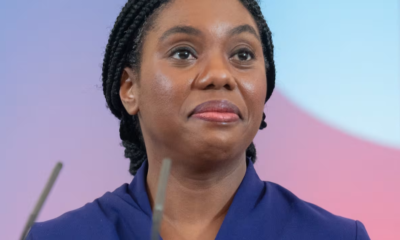
 World News11 hours ago
World News11 hours agoKemi Badenoch condemns UK recognition of Palestinian statehood
-
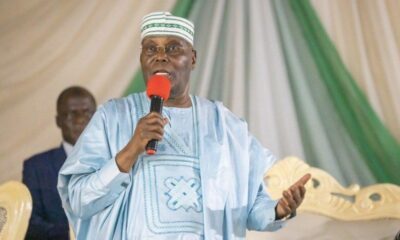
 Politics11 hours ago
Politics11 hours agoNigerians must shun tribalism, vote with conscience in 2027 – Atiku
-

 World News11 hours ago
World News11 hours agoUK, Canada, Australia formally recognise Palestine as independent state
-
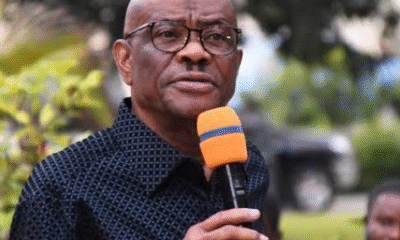
 News12 hours ago
News12 hours agoUK Forensics Expert Petitions Florida Attorney General Over Wike’s Family Property Deals In U.S.
-

 Politics11 hours ago
Politics11 hours agoIf we conduct proper elections, non-performing leaders would be voted out – Jonathan
-
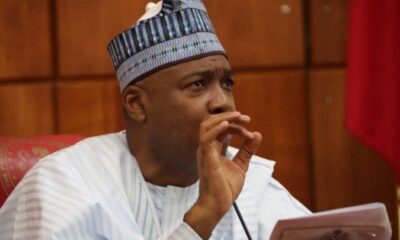
 Politics11 hours ago
Politics11 hours ago2027: Nigerians regaining confidence in PDP as party of hope – Saraki
-

 Business11 hours ago
Business11 hours agoFX reform improved market efficiency but structural financing gaps persist – CPPE
-
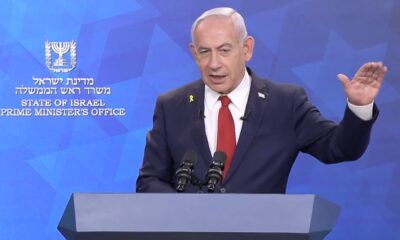
 World News11 hours ago
World News11 hours ago‘You’re rewarding terror’ — Netanyahu rejects UK, Canada, Australia’s recognition of Palestinian state
